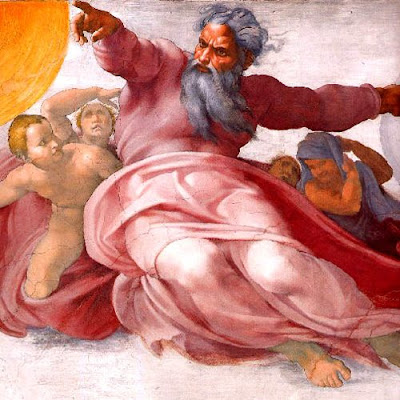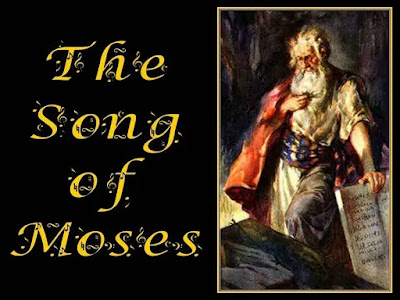[ photo from musicformass.blog - check it out ]
Song of Moses -- Part IV -- How God Reacts To Our Sin -- Deuteronomy 32:19-22.
In the verses above this passage, Moses has just told us how the Israelites (and by us also being human, we too) have forsaken God. Now he tells us in this part of the Song of Moses inspired by God what God's reaction is. Let's take a look.
19. The verse says, "the Lord saw this". You cannot forsake God and turn to idols in your life thinking God won't notice. Forget it. That's a non-starter. And when He sees that, God did, does, and will, spurn us. The dictionary definition for 'spurn' is to reject with disdain or contempt. We can only find some comfort in the fact that God's love and grace towards those He loves, and those who love Him in return, does not allow this spurning to be eternal in nature.
He sees this as a "provocation (by) His sons and daughters", by us, and He puts on His "Father-hat". What would you or I do in a similar situation?
20. We are told here that He then hides His face from us, remains quiet, and sees where our folly will lead us. Parents do that when their children insist on doing something they should not. David Guzik says this, "When God's people forsake Him, He withdraws the intimacy of His presence. At first, this is sometimes seen as a relief, because the conviction of sin is not so great. But then the darkness and desperation sets in."
This also reminds me of need for "tough love". As parents or a spouse that has been cheated, we may like God withdraw the intimacy of our presence, but not our love. God, even in His anger, never withdrew His love for His people and He is not going to start now wth you or me.
He stays behind the curtains and watches where things lead. The text actually says "what our end shall be". And it won't be pretty because we "a perverse generation". Yet we are His "sons" although we have stopped being faithful to Him. Matthew Henry comments on this: "They were faithless, and a people that could not be trusted. When he saved them, and took them into covenant, he said, Surely they are children that will not lie (Isa. 63:8); but when they proved otherwise, children in whom is no faith, they deserved to be abandoned, and that the God of truth should have no more to do with them."
21. We have made Him jealous by turning to gods that are not God. We have used idols to provoke Him to anger (knowingly or unknowingly). So what is His reaction?
The text says, "He will make us jealous with those who are not a people of God." He will provoke us to anger with a foolish nation. Now that requires some digging into. Robert Jamieson provides this assistance: "that is, [those nations] not favored with such great and peculiar privileges as the Israelites (or, rather poor, despised heathens). The language [also] points to the future calling of the Gentiles."
Matthew Henry says this refers to those nations which will give them trouble in the years ahead after they entered into the Promised Land and thus agrees with Jamieson's first option above. But he also points out that Jamieson's reference to this being a future application with respect to the Gentiles also has merit as he writes:
"But the apostle [Paul] applies it to the conversion of the Gentiles, who had been a people not in covenant with God, and foolish in divine things, yet were brought into the church, sorely to the grief of the Jews, who upon all occasions showed a great indignation at it, which was both their sin and their punishment, as envy always is, Rom. 10:19."
22. For God to react in this way -- jealousy for jealousy, provocation for provocation, and anger for anger -- you can be sure of one thing -- He was and is royally ticked off, and that is exactly what the verse says when it speaks of "a fire" being kindled with respect to His anger, and it is so large and so hot that it burns down to Sheol or the nether world; consumes the earth; and sets ablaze the foundations of mountains.
I don't know about you, but I want no part of that response from God on me because of what I have done.
Many people get to this point and say, "What's the use? If God is that mean, and I'm going to suffer an eternal punishment anyway, because I can't be perfect the rest of my life, then I don't need to curtail my life now for Him." What a mistake. What they miss out on is that God has made a way for each of us that will subside His anger, even extinguish it completely as He completely erases our sins.
Note to reader: If you like the way we are studying scripture, why not subscribe to our posts by providing us just with your email? You can do that to the right of this column in the "Subscribe to" section. You can also search our earlier studies in the "Blog Archive" section below that. Finally, please encourage others to study along with us by sharing this link with your family and friends. Thank you and God bless. Ken G.
It would be great if you would share your thoughts or questions on this blog in the comments section below or on social media.










